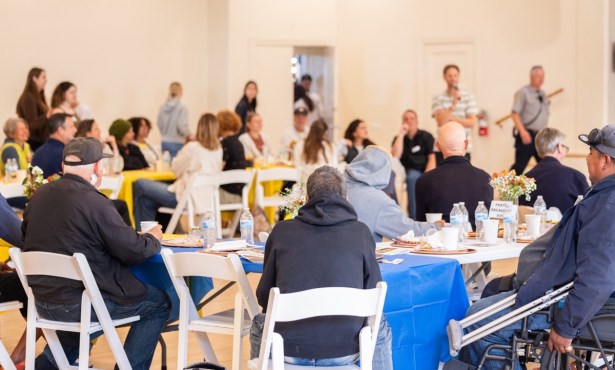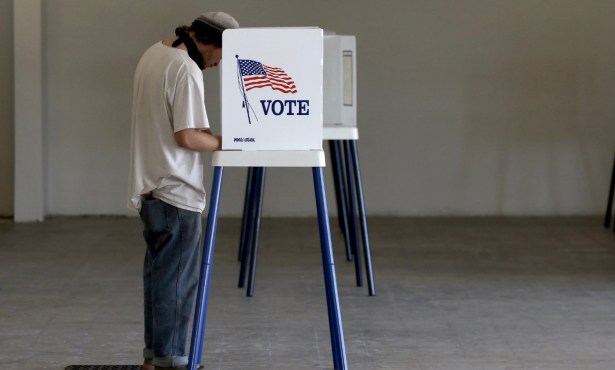Canine Most Foul
HOPE YOU GOT KISSED: When I pick up the morning
newspaper, I like the jokes to stay where they belong — on the
funny pages. But now that even the comic strips have become an
ideological minefield, I suppose everything’s fair game. Still, I
was hardly prepared for the full-page ad, in color no less,
thanking the entire state Legislature and Assembly Speaker Fabian
Núñez for their visionary leadership in passing the most
extravagantly corrupt piece of legislation to come out of the
Statehouse in many moons. I figured the ad — featuring a beaming
couple and their two children basking in the glow of their TV
set — had to be some sort of spoof, a guerilla commentary on how
every single member of the Assembly came together in a unified,
bipartisan frenzy of greed and juice to pass AB 2987, otherwise
known as the cable competition bill. I kept looking for the
nudge-nudge, wink-wink, but it wasn’t there. The bill, which awaits
signing by Arnold Schwarzenegger, will allow the phone companies to
compete with cable companies for the hearts, minds, and wallets of
California’s expanding market of roughly 36 million card-carrying
televidiots. On paper, this sounds great. After all, how could
anything that screws the local cable monopoly be bad? The problem
is that we all get screwed, too.
The way it works now, cable companies negotiate franchise deals
with the city and county governments in which they hope to operate.
In exchange for their quasi-monopoly status, cable companies agree
to surrender a smidgen of their revenues to pay for public access,
education, and government channels. If the cable company doesn’t
behave as promised, the citizens, armed with rakes and pitchforks,
can storm their nearest City Council meeting and demand action. In
Santa Barbara, such citizen input has been exceptionally effective.
As a result, we now have something that’s relatively unique in
California, an autonomous public access operation — funded by cable
revenues — but privately managed and publicly overseen by an
advisory board representing a decent cross-section of the
community. But none of this could have happened without the
leverage provided by the franchise agreement negotiated by our own
City Council. Assuming Arnold signs the bill, that local control is
out the window. In the future, such agreements will be negotiated
with obscure state officials in Sacramento, indifferent, immune,
and far from local residents armed with pitchforks. Gone as well is
the requirement that service providers take care of the entire
community, not just enclaves of wealthy consumers happy to pay for
all the bells and whistles. Sure there’s language saying it’s not
nice to discriminate against consumers on the basis of race or
ethnicity, and there are no timelines mandating when and how phone
companies entering the cable market must deliver what’s known as
“full build-out.” Critics of this aspect of the new bill — led by
the League of California Cities — argue that this glaring omission
will exacerbate the digital divide already separating the rich and
the poor.
In Sacramento, where legalized corruption is not merely a way of
life but a highly advanced art form, the blitz unleashed by phone
giants AT&T and Verizon will win the political equivalent of an
Oscar, a Grammy, and an Emmy combined. According to press accounts,
the phone companies spent in excess of $23 million in lobbying, TV
commercials, and political contributions during the past few
months. The state’s Fair Political Practices Commission boiled that
down to $200,000 a day. That’s enough to give even the fittest of
bag men a serious hernia. Directing the show on the inside was
Fabian Núñez, and he’s very good. AT&T showed its appreciation
by co-hosting a golf tournament at Pebble Beach that helped Núñez
raise $1.7 million for the California Democratic Party. But
AT&T also gave Republicans $35,000, and Schwarzenegger’s
reelection effort $52,000. Aside from the cities and counties, the
only real opposition came from the cable industry. Núñez responded
by including language allowing cable companies to opt out of their
deals with local governments.
After that, the cable industry started spending money of its own
to ensure the bill passed. It worked. In the Assembly — where
relations between Democrats and Republicans most resemble that of
rival prison gangs — there was not one dissenting vote cast against
the bill. In the Senate, there were only four. The last time we saw
such unanimity over a major piece of legislation was in the late
’90s when Sacramento passed the now infamous energy bill that
brought us the now infamous energy crisis of 2000 and the attendant
price gouging by companies like Enron, Duke, and Reliant.
California consumers and utilities were ripped off for many
billions. Without the energy crisis, Gray Davis would never have
been recalled as governor, and the Gubernator would not be in power
today. I’m not saying that history will necessarily repeat itself,
but it’s worth noting that the arguments to sell the cable
competition bill and energy deregulation are almost spitting-image
identical: By allowing greater competition, the consumer will enjoy
greater choices and at lower prices. When was the last time you saw
an industry — the cable companies — colluding with its competition
so it could charge less for its wares?
Our man in Sacramento, Assemblymember Pedro Nava, voted with
Núñez, his buddy and former roommate. According to Common Cause,
Nava was not part of the gravy train, receiving only $1,500 in
campaign donations during the past two years. But according to
advocates of local control, Nava never made himself available to
hear their arguments. Senator Tom McClintock — the Simi Valley
right-winger who, by another manifestation of political corruption
has come to represent Santa Barbara in the State- house — was far
worse. According to Santa Barbara City Councilmember Iya
Falcone — a big wheel with the League of California
Cities — McClintock was openly hostile to her concerns. “When I
mentioned build-out, McClintock told me that was kind of like
asking BMW to build a franchise in South Central,” she said.
It’s only a matter of time before Arnold signs the bill. When he
does, I fully expect to be notified that my cost for cable services
will go down. The only problem is that I fully expect to read it in
the comic section. At least that way I’ll know it’s supposed to be
funny.



